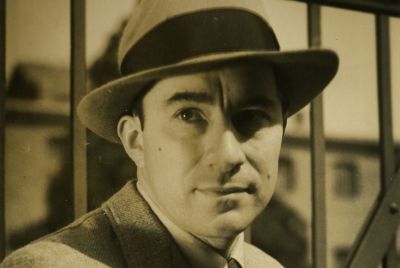
MORGEN BEGINNT DAS LEBEN
(La vita comincia domani, Germania/1933) R.: Werner Hochbaum. D.: 76'. V. tedesca
[Domani comincia la vita] T. int.: Life begins tomorrow. Scen.: Carl Behr. F.: Herbert Körner. M.: Marianne Behr. Scgf.: Gustav A. Knauer, Alexander Mügge. Mus.: Hansom Milde-Meißner. Int.: Erich Haußmann (Robert), Hilde von Stolz (Marie), Harry Frank (il violinista), Walter von Lennep (cantante), Etta Klingenberg (la ragazza del caffé), Edith Schollwer (la cameriera), Gustav Püttjer (l'uomo della giostra). Prod.: Ethos-Film GmbH. 35mm. D.: 76'. version.e tedesca / 1German version. Da: Österreichische Filmmuseum
Introducono i curatori Alexander Horwath e Olaf Möller
La cronaca di una giornata angosciante. Dopo cinque anni di prigione, Robert è libero. Sua moglie Marie vuole passare a prenderlo ma subentra una serie di inconvenienti. I due si cercano, si mancano ripetutamente e intanto Robert inizia a dubitare della fedeltà di Marie e della promessa di un futuro migliore. Un uomo qualunque, una donna qualunque, le gioie e gli incidenti della moderna vita urbana: il regista Hochbaum e lo sceneggiatore Carl Behr si ispirano a film sulla realtà cittadina come Primo amore di Paul Fejos (1928) o Da sabato a domenica di Gustav Machatý (1931), ma la loro visione è complessivamente più cupa. Giunto nelle sale tedesche nell'estate successiva all'avvento dei nazisti, il film è stato giustamente letto come "un sintomo della transizione, un'espressione dell'angoscia nevrotica del 1933" (Karsten Witte). Dalle esperienze di Robert e Marie Hochbaum tesse raffinati montaggi di immagini e suoni, mondo interiore ed esteriore, impressioni e ricordi. Non accontentandosi di esibire le tecniche cinematografiche sperimentali dei tardi anni Venti, con il suo tour de force fatto di piani sequenza, montaggio ritmico e narrazione per immagini Morgen Beginnt das Leben realizza un deciso, impetuoso ritratto dell'inquietudine e del disorientamento: invece delle masse proletarie troviamo le vicine maligne e pettegole dell'ex galeotto, presentate in un montaggio sempre più serrato. Quando la macchina da presa viene fissata su una giostra, il risultato non è l'euforia alla Jean Epstein, ma un movimento lugubre che scruta silenziosamente Robert. La porta di casa non si apre, le strade sono piene di rumori e di sinistri bisbigli, e nel caffè in cui lavorava Robert viene assalito dai ricordi dell'omicidio commesso per impulso. Osservati da una "macchina da presa ammanettata" (secondo l'espressione di Bert Rebhandl) al protagonista, appaiono ancora più preziosi i rari momenti di felice oblio: una cameriera che canticchia una canzonetta di successo, un cameriere che dondola il capo al ritmo della musica. Le riserve di luce del film vengono da questi momenti di tregua più che dalla felice decisione dell'ultimo minuto che segna l'improbabile lieto fine, primo dei tanti inaffidabili epiloghi che punteggeranno l'opera di Hochbaum.
Joachim Schätz
The chronicle of a fearful day. After five years in prison, Robert is set free. His wife Marie means to pick him up, but coincidence intervenes. They search for each other, they repeatedly miss each other, and along the way, Robert comes to doubt Marie's fidelity and the promise of a better tomorrow.
One everyman, one everywoman, and the joys and accidents of modern city life: director Hochbaum and scenarist Carl Behr tap into the vein of contemporaneous city films like Paul Fejos' Lonesome (1928) or Gustav Machatý's From Saturday to Sunday (1931), but their outlook is much darker. Arriving in German cinemas the summer after the Nazi takeover, their film has been fruitfully read as "a symptom of transition, an expression of the general anxiety neurosis of 1933" (Karsten Witte). From Robert and Marie's experiences, Hochbaum weaves sophisticated montages of image and sound, inner and outer world, impressions and recollections. Rather than being content with showcasing late-1920s avant-garde film techniques, Morgen Beginnt das Leben's tour de force of sequence shots, rhythmic editing and wordless storytelling achieves a purposeful, fierce portrait of disturbance and disorientation. Instead of the working masses, an escalating montage collects the ex-convict's vicious, gossiping neighbors. When the camera is attached to a merry-go-round, the result is not exhilaration à la Jean Epstein, but an eerie gliding movement prying Robert. The door at home won't open, the streets are full of noise and sinister whispers, and in the cafe where he used to work, Robert is overcome by memories of the manslaughter he committed on impulse.
As witnessed by Hochbaum's "chained camera" (Bert Rebhandl) breathlessly trailing its protagonist, select moments of blissful oblivion stand out all the more: a waitress warbling a hit song, a bellhop bobbing to background music. Such reprieves provide the film with its pockets of light, rather than the fortunate lastminute resolution that follows desperation - the first in a string of untrustworthy happy endings in Hochbaum's œuvre.
Joachim Schätz
Tariffe:

Numero posti: 144
Aria condizionata
Accesso e servizi per disabili
Il nostro cinema aderisce al circuito CinemAmico: è possibile utilizzare l’applicazione MovieReading® per i film di cui è prevista audiodescrizione e/o sottotitolazione sull'applicazione.
Tel. 0512195311











